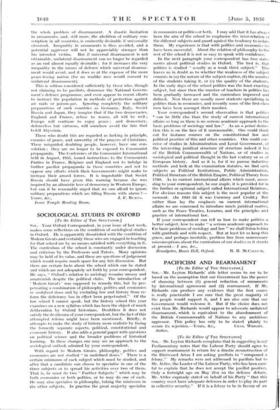SOCIOLOGICAL STUDIES IN OXFORD
[To the Editor of THE SPECTATOR.] SIR,—Your Oxford Correspondent, in your issue of last week, makes some reflections on the condition of sociological studies in Oxford. He is apparently dissatisfied with the condition of Modem Greats and certainly those who are engaged in teaching for that school are by no means satisfied with everything in it. The curriculum of the school is constantly under discussion and criticism by the Professors and .Tutors. Many opinions may be held of its value, and these are questions of judgement which would require much space for any fair discussion. But there are certain facts about the school which can be stated and which are not adequately set forth by your correspondent. He says, "Oxford's relation to sociology remains uneasy and amateurish despite the political clubs. The introduction of Modern Greats' was supposed to remedy this, but by per- petuating a combination of philosophy, politics and economics in undefined doses and by excluding law and history from re- form the deficiency has in effect been perpetuated." Of the law school I cannot speak, but the history school this year examines on a new syllabus which has been the object of much deliberation by Oxford historians. Doubtless it does not satisfy the desiderata of your correspondent, but the fact of this attempted reform might have been mentioned. Briefly, it attempts to make the study of history more realistic by fusing the formerly separate aspects, political, constitutional and economic history. It also adds a general paper with questions on political science and the broader problems of historical learning. In these changes one may see an approach to the sociological outlook admired by your correspondent.
With regard to Modern Greats, philosophy, politics and economics are not studied "in undefined eloses." There is a certain minimum of each subject which must be studied, and after that a candidate can choose to specialise in one of the three subjects or to spread his activities over two of them. That is, he must do two Further Subjects" which may be both economics or both politics, or he may do one of each. He may also specialise in philosophy, taking the Minimum in the other subjects. In practice the great majority specialise
in economics or politics or both. I may add that it has always been the aim of the school to emphasise the inter-relation of
the different subjects and guard against the tendency to isolate them. My experience is that with politics and economic; we have been successful. About the relation of philosophy to the rest of the school it is not so easy to speak with confidence.
In the next paragraph your correspondent has two state- ments about political studies in Ox/ord. The first is, that
politics is studied "usually as a weak third subject." This leaves us in doubt as to whether the weakness of the subject consists in (a) the nature of the subject-matter, (b) the number of the students taking it, or (c) the quality of the students. In the early days of the school politics was the least exacting subject, but since then the number of teachers in politics has been gradually increased and the curriculum improved and defined. Now there are usually more students specialising in politics than in economics, and recently some of the first-class men have been amongst their number.
Your correspondent's second observation is that polities
can be little else than the study of current international affairs so long as there is no serious academic approach to the basic problems of sociology and law." As an a priori deduc- tion this is on the face of it unreasonable. One could think out for instance courses on the constitutional law and political practice of this and other countries. One could con- ceive of studies in Administration and Local Government, of the interesting juridical structure (if structure indeed it be) of the British Commonwealth of Nations, or of studies in sociological and political thought in the last century or so of European history. And so it is, for if we pursue inductive methods and look at the examination statutes, we find such subjects as Political Institutions, Public Administration, Political Structure of the British Empire, Political Theory from 1760. As to current international affairs which must, accor- ding to your correspondent, be our staple, it is provided for in the further or optional subject called International Relations. For obvious reasons this subject is the most popular at the moment. (In 1931-32 it was Currency and Credit.) But rather than lay the emphasis on current international affairs we are concerned to introduce much juridical matter, such as the Peace Treaties, Locarno, and the principles and practice of international law.
If your correspondent can tell us how to make politics a better subject, how to make a serious academic approach to the basic problems of sociology and law "we shall listen to him with gratitude and with respect. But at least let us keep this grave, and perhaps insoluble, problem free from unnecessary misconceptions about the curriculum of our studies as it stands at present.—I am, &c., Broadgates, Boars Hill, Oxford. R. B. Mc:CALI:cm.














































 Previous page
Previous page